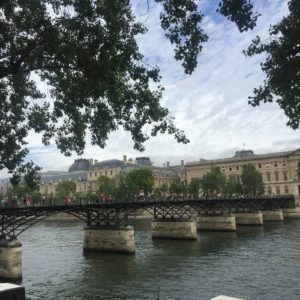I’ve known that I wanted to do science research since the age of sixteen, when I spent my first summer in a neuroscience lab. My time in the lab taught me many new skills and enabled me to immediately apply them to unsolved problems–what other summer job could be more interesting than that? Though my specific interests have shifted slightly (I’m now a chemical and biological engineer rather than a neuroscientist), I’ve devoted every summer since to benchwork of some sort.
Consequently, when I started to look for laboratory opportunities last year, I immediately gravitated towards biology research. I had loved the past three summers–why not experience another? In the winter, I applied to internships through Princeton’s International Internship Program (IIP), and I was lucky enough to receive an offer to study the mechanisms of Shigella (a bacterium that causes dysentery) infection at the Pasteur Institute in Paris, France. I accepted immediately, thrilled that I’d be spending my summer abroad–and on Princeton’s dime!
But as the year wore on, I started to consider what the added value of another summer of wet-lab research would be, especially since time constraints would limit my contribution. I felt like was narrowing in on my chosen field too early. Wouldn’t I be bored?
These worries about my lab research began to fade as another opportunity presented itself. In my spring Writing Seminar, I was able to explore independent history of science research under the guidance of professor Alex Davis. After many conversations throughout the spring semester about my passion for the humanities, he invited me to work remotely on his book, Sex on the Brain, which explores how modern cognitive scientists think about gender and sexual diversity. My job was simple: I was tasked with sifting through archival sources and assembling a comprehensive timeline of how scientists thought about gender and brains during the nineteenth and twentieth centuries. I thought the work would be interesting, and it ultimately provided me with some extra spending money to travel around Europe!
Before heading off to Paris, I had no idea how important the perspective provided by studying the humanities could be in my scientific pursuits. All summer, I spent my days slogging through bench work. But my afternoons were spent sitting in French cafes and parks, reading early twentieth century neuroscience papers and medical journals and paying close attention to the methodologies researchers used. As I marveled at their patience and attention to detail, I gained a new perspective on the hours I was spending culturing bacteria and tending to my cells.

Pipetting for hours might be boring, but my heightened awareness that I was contributing to a greater scientific tradition made my labor seem worth it. Though my day to day tasks weren’t always enlightening, my history of science research reminded me that they were still important. And when I did make progress, I was even more satisfied knowing that I was part of a larger legacy.
— Ella Feiner, Engineering Correspondent

